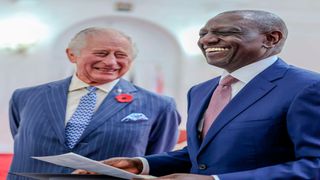
Britain's King Charles III (left) with Kenyan President William Ruto during the ceremonial welcome at the State House in Nairobi on October 31, 2023.
| PCSOur Columnists
Premium
Forgiveness heals all wounds
I still hate what the British did to my village long before I was born. I grew up with stories of unspeakable brutality and racism.
I think the idea of rebellion was brought to our ridge by Maj Ruku, who had fought in the Second World War in Burma. Then the local colonial chief, Machuguma, sometimes in the 1940s, imposed a tax which pushed young men to flood to Kariakor in Nairobi to look for work so that they could pay the tax back home.
I think my father was swept up in that flood and, since his cousin was in the thick of the oathing, stealing guns and the rest of it, it didn’t take long before he was in it too. Ruku was killed early in the struggle; my father was run down, shot and sent to detention for seven years, during which life was so rough that he never talked about it after he was freed.
I still hate the suffering that my mother, a teenage mum, endured at the hands of the colonial state—spending the day working in her garden and the nights in a stockade. And sometimes staying behind to guard her crops, not knowing whether she and her baby would survive the night.
The Mau Mau came out at night looking for food; if they caught you, they probably might be in bad mood and lope off your head. If the homeguard suspected you didn’t sleep in camp, it would be assumed that you were Mau Mau and would wrap a leather thong around your neck and strangle you.
The loneliness and terror our women, along with most men in prison, suffered and the trauma it left in my community haunts me.
I hate the fact that the heroism of those who didn’t fight on either side—neither for the government nor for the Mau Mau—but just endured the evil that blighted the land is never acknowledged. That just surviving those horrible years and that brutal war was, in itself, an act of great courage.
I hate the fact that we were disinherited; we lost the bulk of our ancestral land because we were rebels and the land that was supposed to compensate us was stolen by Jackson Angaine, who, to put salt to the wounds, passed himself off as “The King of Meru” for many years and lived to a ripe old age.
I hate that the Jomo Kenyatta government killed Field Marshall Baimungi Marete and his fighters on January 26, 1965. Who even knows that he was Field Marshall Dedan Kimathi’s second-in-command and commanded the Mau Mau after Kimathi was killed in 1956? His widow was recently arrested when she demanded the land due to her husband.
I hate that because of petty tribalism and selfishness we never truly honoured those who fought for the simple idea that we, too, were human, not monkeys, and if indeed we were monkeys, sought to live in freedom in our own forest.
But I’m grateful that the African Republic of Kenya has given us a home, where we live in freedom and poverty, misruled by (mainly) thieves who couldn’t govern even their own backsides—on a good day—and where one White Witch chooses for 50 million Africans, many who believe that all Europeans are Father Christmas, love Africans, are here to help and give us “aid”.
I’m grateful for the colonists who grabbed us by the scruff of our naked bums and shoved us into the 19th Century, taught us how to tame our wild land, gave us book learning and drilled into us that our entire cultural heritage was primitive and evil and European culture was Godly and civilised.
I’m grateful that we made peace with the British, that we can welcome their king to our land, 60 years later. We are still here, without any bitterness or hatred in our hearts. In Imenti, where I plant trees and beans, we have a problem-solving strategy (much loved but, unfortunately, not super-effective) called “just sit back and let the termite fell the fencing post”.
There are two things that Africans are very good at, and they do them better than anyone else. The first is patience. We are happy to sit and watch flower become fruit, season come, season go. We suffer with such a natural, patient ease, borne of long experience at the rump end of the food chain, just next door to the orangutans and the donkeys.
The other is forgiveness: An incredible capacity to let go of stuff. We bear no grudges about what happened here 60 years ago and we forgave the Europeans for selling us like goats in the Americas.
A cause for celebration during the royal visit.
* * *
Speaking of goats, Deputy President Rigathi Gachagua has been (how to put it) conspicuously missing in action during the visit by the British King and Queen.
He is, apparently, selling our coffee beans in Belgium. One hopes that the he-goat has seen the rope rubbing its nose as the festive season bears down upon us?





